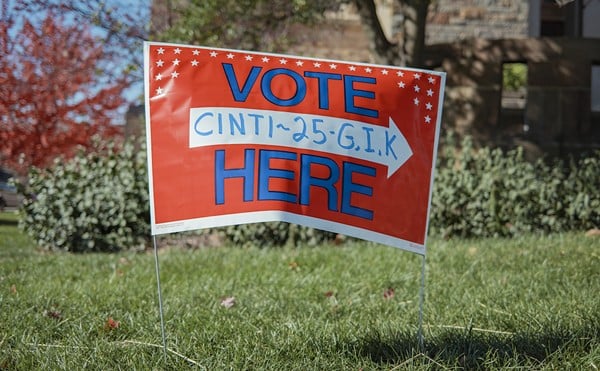Reanae McNeal is a survivor. As such, she believes blacks don't speak openly enough about rape and sexual assault. Therefore, healing and recovery occur slowly — or not at all. McNeal, 31, has surmounted depression, abusive relationships and suicidal ideation. For her, every day is another chance to show, through her poetry and one-woman plays and performance pieces, that reality is what we make it.
The artist will perform Don't Speak My Mother's Name in Vain at 6:30 p.m. Wednesday at the University of Cincinnati, during the Women's Center's Sexual Assault Awareness Week and in conjunction with Crazy Ladies Bookstore and Students Organized Against Rape.
Portraying eight black female characters, the one-woman show is a collection of interrelated vignettes tracing the "herstory" of rape and sexual assault in a world already oppressive to black women.
Speaking from her Illinois home, McNeal says the creation of the play was a matter of necessity.
"I originally wrote that play for my own healing process," she says, "at the time I was sexually assaulted."
She says it so bluntly there is no space to gasp in response.
McNeal describes the attack as a turning point, teaching her that "beauty can be birthed out of trauma."
"That's what transpired in my own life," she says. "I didn't even have a concept of what rape was. That was something within the African-American community that we don't talk about, for whatever reason. Everyone I'd seen on TV talking about rape were white women. A lot of times we must become what we need. I needed someone to speak out about this, so I had to become that."
McNeal drew four of the characters from research and stories passed on by her grandmothers, while the other four are contemporary black women surviving sexual assault.
McNeal, who is an elder in a non-denominational church, says it would be easy to acquiesce, like the characters in her play, to the sorrow of living with a broken spirit. Healing, though, is a constant process.
"I take the women through a journey," she says. "I really hope that what African-Americans get out of this is that healing is possible and capable. Even though we live in a crappy world, I have liberty in my spirit. God has given me joy."
McNeal's work educating audiences on the triumphs to be had through adversity is an anomaly of who she was supposed to become. She has a bachelor's degree in political science and African-American studies from Western Illinois University. Her father, an engineer, and her mother, an accountant, groomed her to be an attorney.
But McNeal says God spoke to her spirit, leading her down a new path. While working as a volunteer and staff trainer for a domestic-violence and sexual-assault recovery program, McNeal waited to find her life's work.
"Every day after work, I would pray to God to show me my divine purpose," she says. "One day I was on my lunch break. I was praying in my office and I heard God saying to my spirit, 'It's time.' I was in a divine timing zone. I put in my two weeks' notice, things fell into place and I've been going ever since. I've been all over the United States and all around the world."
McNeal has garnered accolades for her poems and plays.
"A Word," a poem dedicated to Betty Shabazz, was a finalist in the 1994 National Iowa Women's Poetry Competition. Her play, Slave Shout, won the 1995 Texas History Drama Competition and placed sixth in the National History Drama Competition the following year.
McNeal knows few will understand the "leap of faith" necessary to change her way of living so she could bring her message to the world.
Further, McNeal's mission is to break the age-old silence surrounding rape and sexual assault, particularly among blacks.
"Silence goes all the way back to slavery, because we had to be silent about our pain," McNeal says. "It was legislated into law that (black women) were unrapable. Black men couldn't protect us because they would've been lynched. The protective mechanism was silence surrounding what happened around the black female body. Jumping to the present day, there is the demonization of black men, the enticement by black women — 'She asked for it' — and then, if we turn over our men to the police, they're no friend of mine or his, so there are a lot of layers to silence."
History and cultural obstacles notwithstanding, healing remains attainable, McNeal says.
"I don't remember my last bad day," she says. "Healing has to be taken one day at a time. It is possible because I'm walking around. I'm the testimony."
Reanae McNeal will perform Don't Speak My Mother's Name in Vain at 6:30 p.m. Wednesday in Room 118 at the UC College of Law.





